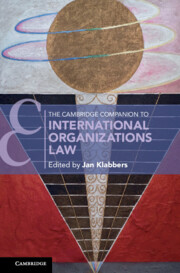Book contents
- The Cambridge Companion to International Organizations Law
- Cambridge Companions to Law
- The Cambridge Companion to International Organizations Law
- Copyright page
- Contents
- Contributors
- Acknowledgements
- Cases
- Introduction
- 1 Beyond Functionalism
- 2 The Concept of International Organization
- 3 Accountability
- 4 Inclusion and Exclusion in International Organizations
- 5 A Legal Framework on Internal Matters
- 6 Standard-Setting in UN System Organizations
- 7 Operational Activities
- 8 Deliberation
- 9 Teaching Statehood
- 10 Interaction between International Organizations
- 11 The International Organization for Migration and the Duty to Protect Migrants
- 12 Global Health
- 13 Energy Provision
- 14 International Organizations, Disarmament and State Behaviour
- 15 International Organizations and Stories of Development
- 16 Food Security and International Organizations
- 17 Financial Stability
- Epilogue
- Bibliography
- Index
13 - Energy Provision
Published online by Cambridge University Press: 31 March 2022
- The Cambridge Companion to International Organizations Law
- Cambridge Companions to Law
- The Cambridge Companion to International Organizations Law
- Copyright page
- Contents
- Contributors
- Acknowledgements
- Cases
- Introduction
- 1 Beyond Functionalism
- 2 The Concept of International Organization
- 3 Accountability
- 4 Inclusion and Exclusion in International Organizations
- 5 A Legal Framework on Internal Matters
- 6 Standard-Setting in UN System Organizations
- 7 Operational Activities
- 8 Deliberation
- 9 Teaching Statehood
- 10 Interaction between International Organizations
- 11 The International Organization for Migration and the Duty to Protect Migrants
- 12 Global Health
- 13 Energy Provision
- 14 International Organizations, Disarmament and State Behaviour
- 15 International Organizations and Stories of Development
- 16 Food Security and International Organizations
- 17 Financial Stability
- Epilogue
- Bibliography
- Index
Summary
Energy, in the broad sense of all sources and forms of energy, fossil, renewable, electricity and fuels, is a latecomer to the field of international organization. The twin principles of permanent sovereignty of producer states over their natural energy resources and the sovereignty of consumer states over their energy mix seemed to remove this matter from the realm of international law and to allocate it to domestic law. The organizational architecture reflects this. Different from other functional systems such as health or trade, there is no single, central international organization of universal membership for the energy sector.
- Type
- Chapter
- Information
- The Cambridge Companion to International Organizations Law , pp. 294 - 314Publisher: Cambridge University PressPrint publication year: 2022
- 1
- Cited by

